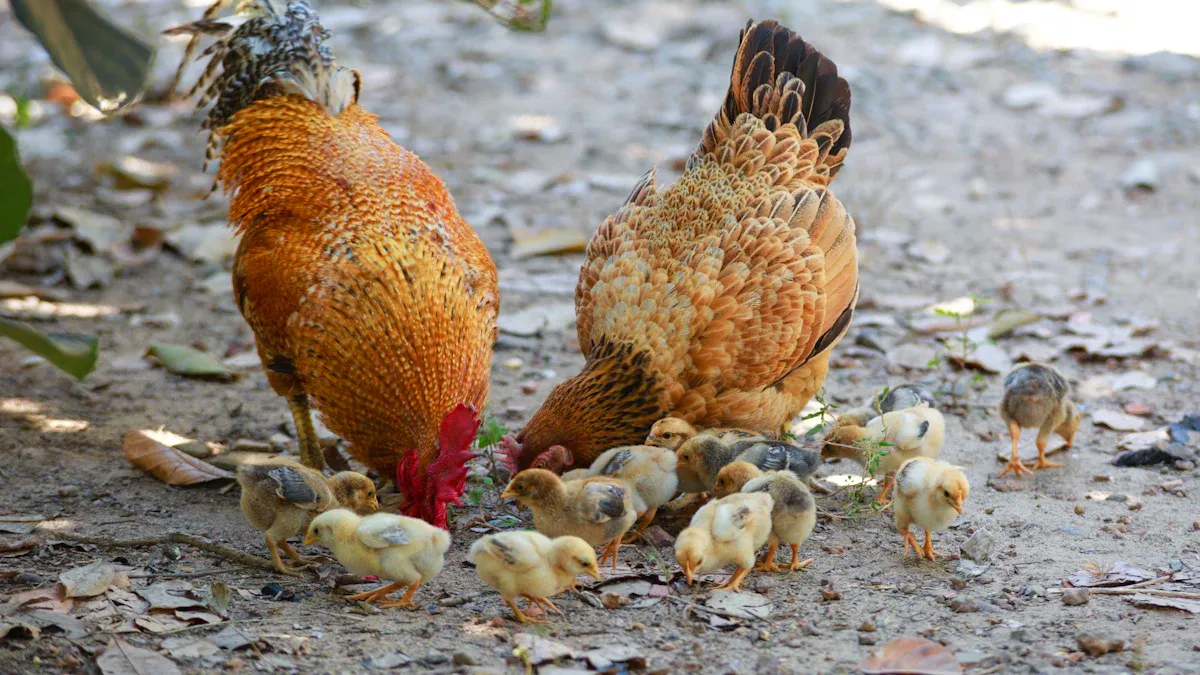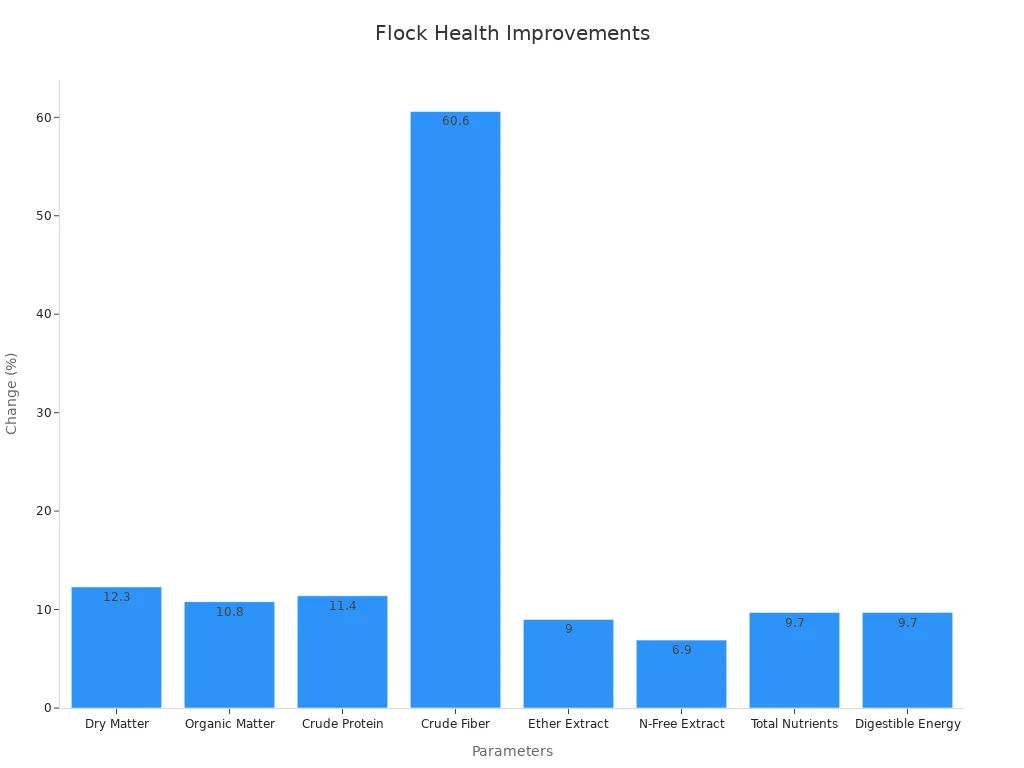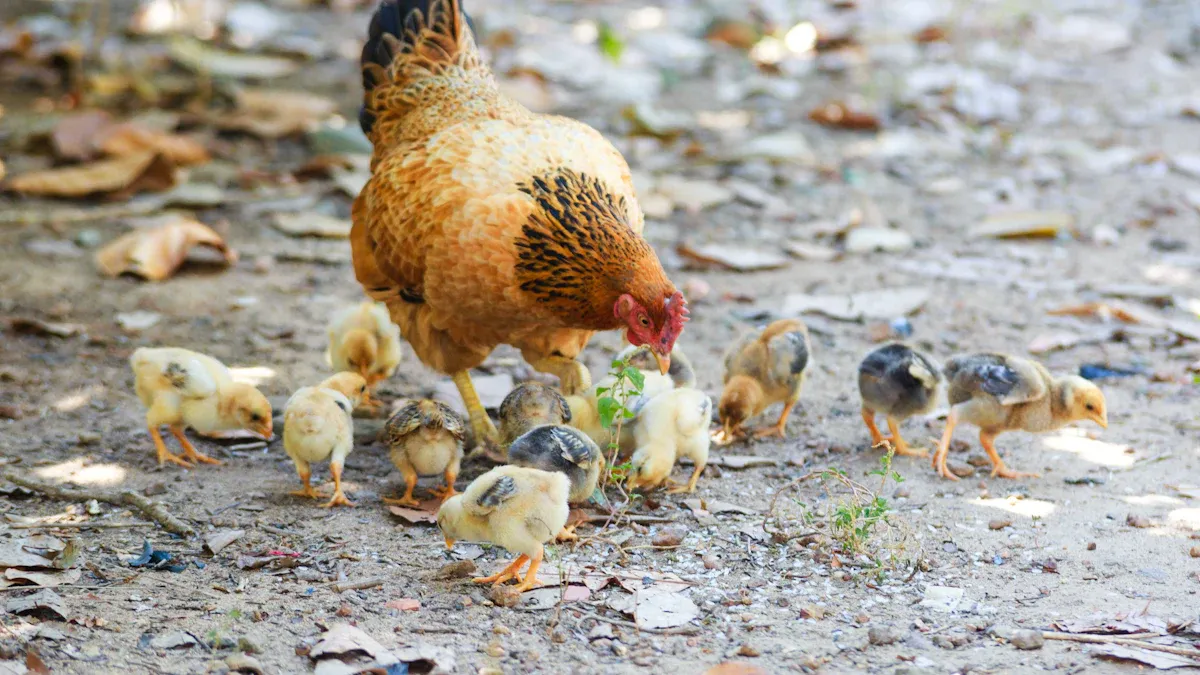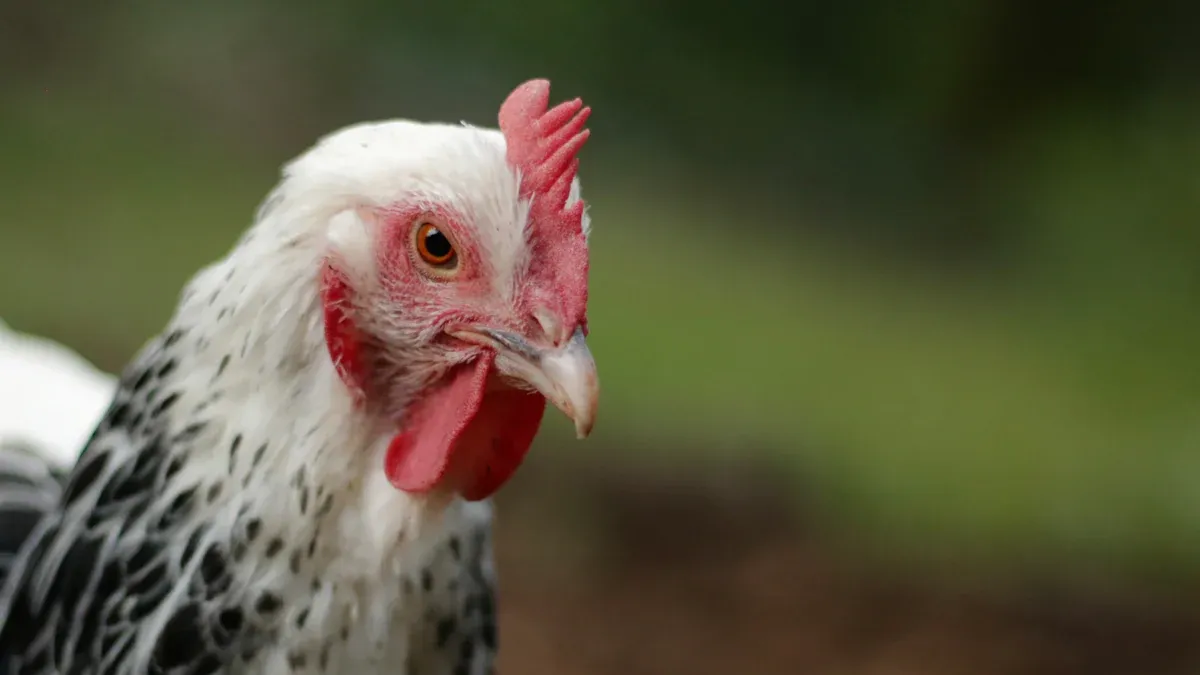
Mealworms Chicken Feed gives hens a boost with high-quality protein and nutrients. Chickens enjoy the taste and the natural enrichment it brings.
| Protein | Fat (dried) | Optimal Inclusion |
|---|---|---|
| 28-36% | up to 40% | 4-10% |
| Studies show flocks gain better growth and stronger eggshells. | ||
 |
Key Takeaways
- Mealworms provide high-quality protein and essential nutrients that help chickens grow strong feathers, lay healthier eggs, and stay energetic.
- Feeding mealworms supports hens’ immune systems, improves egg quality, and encourages natural behaviors that reduce stress and keep chickens happy.
- Offer mealworms as a treat about two to three times a week, making up 5-10% of the diet, and choose quality mealworms to keep your flock healthy and balanced.
Mealworms Chicken Feed: Nutrition and Health Benefits

High Protein and Essential Nutrients
Mealworms Chicken Feed stands out as a powerhouse of nutrition for backyard flocks. Chickens need protein to grow, develop strong feathers, and lay healthy eggs. Mealworms provide a protein content that rivals or even surpasses many traditional feeds. Their protein includes essential amino acids, which help chickens build muscle and repair tissues.
Did you know? Mealworm protein contains essential amino acids ranging from about 10.8% to 30.4%, making it a strong competitor to soybean meal and other common feeds.
Mealworms also offer more than just protein. They are packed with healthy fats, fiber, vitamins, and minerals. These nutrients support energy, digestion, and bone health. Here’s a quick look at what mealworms bring to the table:
- High-quality protein for growth and feather development
- Healthy fats that give chickens energy and help them absorb vitamins
- Fiber for smooth digestion
- Vitamins like B12 for nerve function
- Minerals such as phosphorus for strong bones
Recent studies show that mealworm-based ingredients have high amino acid digestibility, often exceeding 90%. This means chickens can easily use the nutrients in Mealworms Chicken Feed.
Supporting Egg Production and Feather Quality
Egg-laying hens need extra nutrition to produce strong, healthy eggs. Mealworms Chicken Feed helps hens lay eggs with thicker shells and richer yolks. The protein and minerals in mealworms support the formation of eggshells and the color of the yolk.
Let’s look at some research findings:
| Parameter | Effect of Mealworm Supplementation |
|---|---|
| Egg production | Tended to increase |
| Eggshell thickness | Tended to improve |
| Egg yolk color | Tended to improve |
| Haugh units (egg freshness) | Increased during storage period |
Mealworms Chicken Feed also helps hens grow beautiful, glossy feathers. The amino acids and fats in mealworms are important for feather growth, especially during molting. Chickens with better feather quality stay warmer and look healthier.
Boosting Immunity and Overall Wellbeing
A strong immune system keeps chickens active and less likely to get sick. Mealworms Chicken Feed contains bioactive compounds like chitin and antimicrobial peptides. These help chickens fight off germs and stay healthy.
Studies show that chickens eating mealworms have better immune responses. For example, small additions of mealworm meal can change levels of important immune proteins and improve growth at the same time. Here’s a summary of some immune benefits:
| Immunological Metric | Effect of Mealworm Inclusion | Statistical Significance | Additional Notes |
|---|---|---|---|
| IgY levels | Decreased in insect-fed groups vs control | P = 0.045 | Observed in first trial |
| IgM levels | Decreased in insect-fed groups vs control | P < 0.001 | Observed in both trials |
| Correlation of IgM with BWG | Negative correlation (r = -0.4845) | P < 0.001 | Indicates immune-growth performance link |
Mealworms Chicken Feed also supports gut health and helps chickens digest their food better. Chickens fed mealworms often show improved growth, better feed conversion, and more active behavior. This makes mealworms a smart choice for anyone who wants happy, healthy hens.
Mealworms Chicken Feed: Enrichment and Safe Feeding

Encouraging Natural Foraging and Reducing Stress
Chickens love to scratch, peck, and search for food. Mealworms Chicken Feed taps into these natural instincts. When owners scatter mealworms in the yard or use special feeders, chickens get busy exploring and foraging. This activity keeps their minds sharp and helps them feel less bored. Studies show that chickens given mealworms spend more time walking, wing flapping, and scratching. These behaviors mean they feel motivated and engaged.
Feeding mealworms also helps lower stress. Scientists have found that chickens with access to mealworms show fewer signs of fear and have lower stress markers in their bodies. For example, birds that eat mealworms have reduced levels of certain stress chemicals and show more relaxed behaviors. This makes mealworms a great way to keep hens happy and calm.
Tip: Try hiding mealworms in bedding or grass to make feeding time even more fun for your flock!
How to Feed Mealworms: Serving Size, Frequency, and Form
Mealworms work best as a treat, not the main meal. Research suggests that mealworms should make up about 5-10% of a chicken’s total diet. A good rule is to offer a handful of mealworms per chicken, two or three times a week. This amount supports growth, feather health, and egg production without causing imbalances.
Owners can choose between live or dried mealworms. Dried mealworms are easy to store and last longer, while live mealworms encourage even more natural foraging. Both forms provide great nutrition.
Choosing Quality Mealworms and Avoiding Overfeeding
Quality matters when picking mealworms for your flock. Look for products that are high in protein, low in saturated fat, and rich in minerals like phosphorus and zinc. Commercially bred mealworms often meet these standards. Always check the label for nutritional information.
Overfeeding can lead to problems. Stick to the recommended serving size and avoid making mealworms the main food. This keeps chickens healthy and ensures they get a balanced diet.
| Quality Benchmark | What to Look For |
|---|---|
| High Protein | At least 28% protein (dry basis) |
| Low Saturated Fat | Meets “low saturated fat” claims |
| Mineral Richness | Phosphorus, magnesium, zinc, etc. |
Mealworms Chicken Feed brings real value to backyard flocks. Many farmers see benefits like lower feed costs and happier hens.
- In a South African study, 72% of small-scale farmers wanted to use mealworms for their chickens.
- Younger farmers and those using mixed feeds showed more interest.
Mealworms also help farms save money. Studies show that replacing part of regular feed with mealworms can cut feed costs by up to 18%. This makes Mealworms Chicken Feed a smart choice for healthy, productive hens.
FAQ
How often should chickens eat mealworms?
Chickens can enjoy mealworms two or three times a week. This keeps their diet balanced and their health strong.
Can chicks eat mealworms too?
Yes, chicks can eat mealworms. Owners should crush the mealworms and offer small amounts to help chicks grow.
Are dried mealworms as good as live ones?
Dried mealworms give the same nutrition as live ones. They also store longer and make feeding easier for busy owners.
Tip: Always provide fresh water when feeding mealworms!


